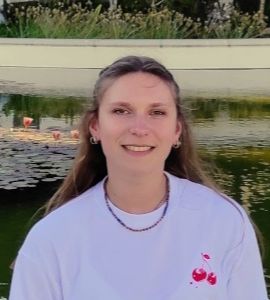
Lors de la réunion scientifique organisée sous la tutelle de EuPA (European Proteomics Association) en juin dernier à Saint Malo, la FPS a mis à l’honneur Laurine Lagache pour l’ensemble de ses travaux de thèse intitulé “Visualizing the molecular interaction network-level heterogeneity of malignant tumors by mass spectrometry imaging”. Dr Lagache a soutenu, avec réussite, devant un jury en Décembre 2024, sous la supervision du Pr. Michel SALZET et la co-supervision du Dr. Nawale HAJJAJI à l’Université de Lille.
I am truly honored to have received the 2025 Thesis Prize from the French Proteomics Society (FPS), its Scientific Committee, and Board. It was also a privilege to present my thesis work at the EuPA Congress in Saint-Malo, an experience that further enriched this milestone. I am deeply grateful to my thesis supervisor, Michel Salzet, as well as Isabelle Fournier, Antonella Raffo Romero, and Yanis Zirem, whose guidance, expertise, and constant support have been invaluable throughout this journey. I also wish to thank the members of my committee and my fellow researchers for their time, insights, and constructive feedback, all of which played a crucial role in shaping and completing my work.
My thesis focused on tackling one of today’s most pressing medical challenges: breast cancer, which remains the most frequently diagnosed cancer worldwide with 2.26 million new cases and 685,000 deaths reported in 2020. Despite significant therapeutic advances, up to 30% of patients relapse, underscoring the urgent need for new strategies to better understand and combat the disease. A central driver of recurrence is tumor heterogeneity, where genetically related but functionally distinct subpopulations coexist and evolve within the tumor microenvironment (TME). These heterogeneous clusters differ in molecular features, metabolic activity, and resistance mechanisms, and their dynamic interactions, whether competitive, cooperative, or supportive, enable resistant clones to persist, fueling relapse and metastasis.
To conceptualize this adaptive behavior, we introduce the notion of “tumor psychohistory”, proposing that breast cancer follows a semi-predictable evolutionary path defined not only by clinical subtype but also by its molecular identity and continuous adaptation to environmental pressures. To test this, we applied MALDI mass spectrometry imaging (MSI) combined with spatial proteomics and machine learning to longitudinally analyze luminal, triple-negative, and HER2 tumors, preserving spatial context while identifying 11 distinct molecular clusters independent of subtype or treatment. Case studies highlighted diverse evolutionary trajectories: one patient exhibited increasing aggressiveness and treatment resistance, another showed favorable shifts with reduced pathway activity, while a third revealed extensive heterogeneity across metastatic sites, suggesting shared mechanisms between primary and metastatic tumors.
Collectively, these findings underscore the pivotal role of the TME in shaping heterogeneity and resistance, forming a dynamic “heterogeneity community” that drives progression. By integrating spatial proteomics with computational modeling, this work demonstrates that breast cancer behavior is more accurately explained by its evolving heterogeneity than by static subtype classification, reinforcing the need for personalized and adaptive therapeutic strategies that anticipate tumor evolution and target emerging vulnerabilities.
Laurine Lagache

.jpg)
